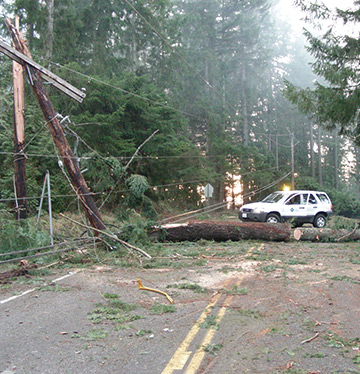Storm safety
Rain and strong winds are a regular part of living in Western Washington.Will you be ready when the next big storm hits? We hope you’ll use the tips below to make sure you and your family are prepared.
Before
- Keep your emergency kits handy.
- Learn what to do if there is an outage.
- Unplug sensitive electronic equipment such as computers.
- Know which natural gas appliances will continue to operate if there is an outage:
- Natural gas water heaters
- Gas log fireplaces
- Gas ovens and ranges. If it uses electric ignition, have matches nearby to light the flame.
- Natural gas barbeques. Remember: never bring a portable grill indoors.
- If you’re using a generator, follow the manufacturer’s instructions. See safety tips about portable generators.
If you live in a flood zone, check out our flood safety tips.
During
- Keep track of the storm as it develops.
- If there is an outage:
- Turn off lights and appliances.
- Leave one light switch on so you'll know when your power is restored.
- Use flashlights instead of candles.
- Keep your freezer and refrigerator doors closed; open them only when it is necessary.
- Never use a gas range, indoor cooker, charcoal or gas barbeque for heating.
- Close curtains and drapes to keep the heat in.
- Wear warm clothes in layers.
- If the indoor temperature drops to 55 degrees or below, open your faucets so there is a constant drip to prevent pipes from freezing.









